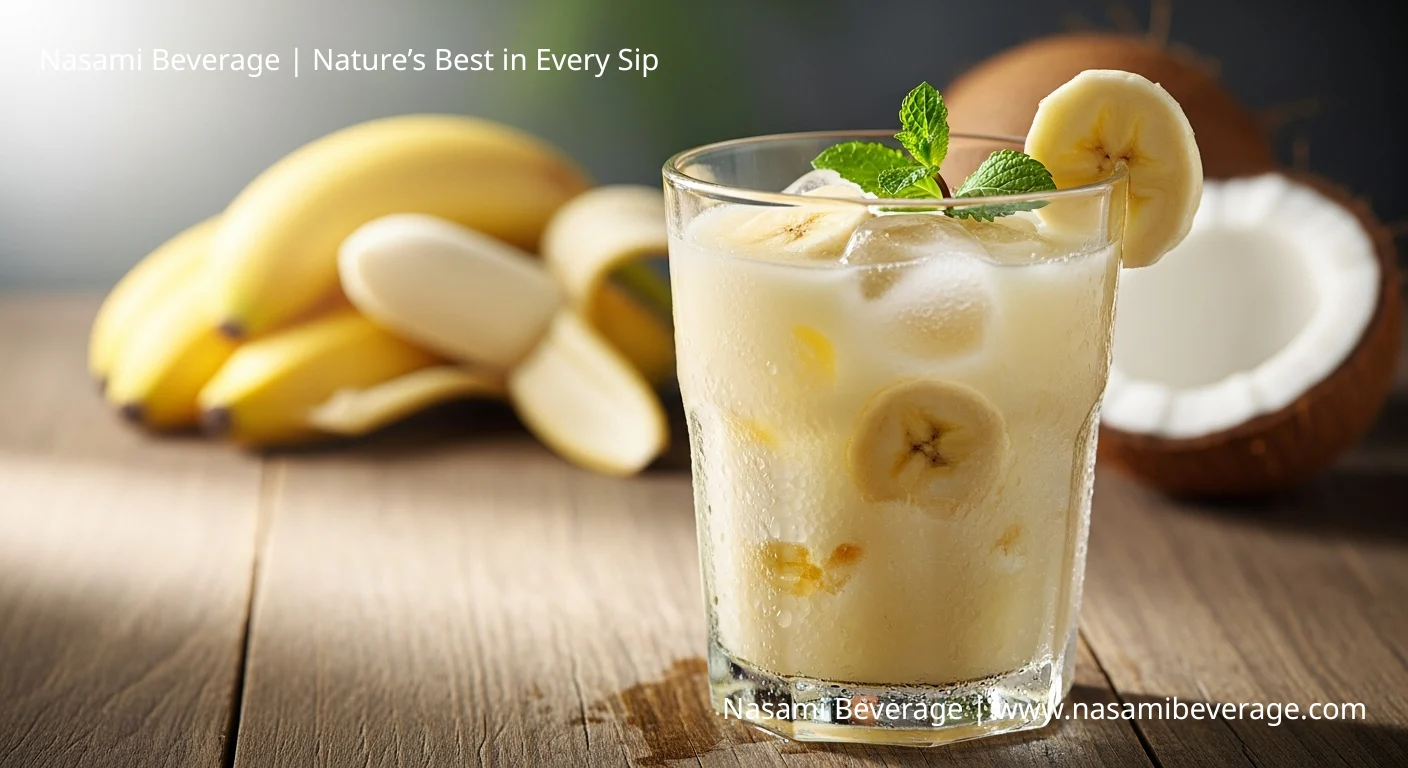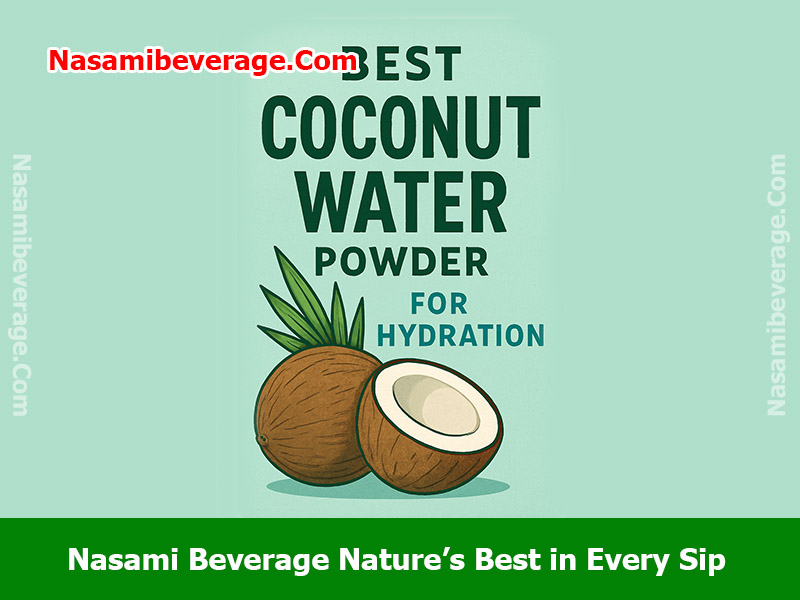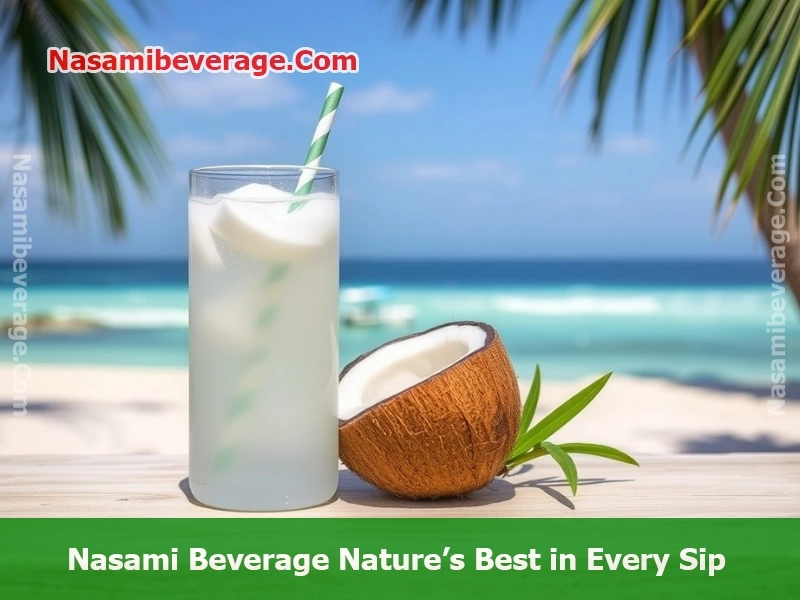In the crowded market of healthy beverages, Bai has carved out a significant niche with its “Antioxidant Infusion” drinks. Among its popular offerings is bai coconut water, which promises the tropical flavor and hydrating properties of coconut water without the high sugar content. But is Bai Coconut Water good for you? This article provides an in-depth analysis of its ingredients, nutritional value, and a balanced look at its benefits and potential drawbacks to help you make an informed decision.
Disclaimer: This information is for educational purposes only and does not replace professional medical or veterinary advice. Always consult a qualified professional before making decisions related to your health or your pet’s health.
What is Bai Coconut Water?
Bai Coconut Water, specifically the Molokai Coconut flavor, is a flavored beverage that uses coconut water concentrate as a primary ingredient. It is part of the Bai Brands’ lineup of drinks, which are marketed as a healthier alternative to sugary sodas and juices. The brand’s main selling point is its use of antioxidants and plant-based sweeteners to deliver flavor with minimal calories and sugar.
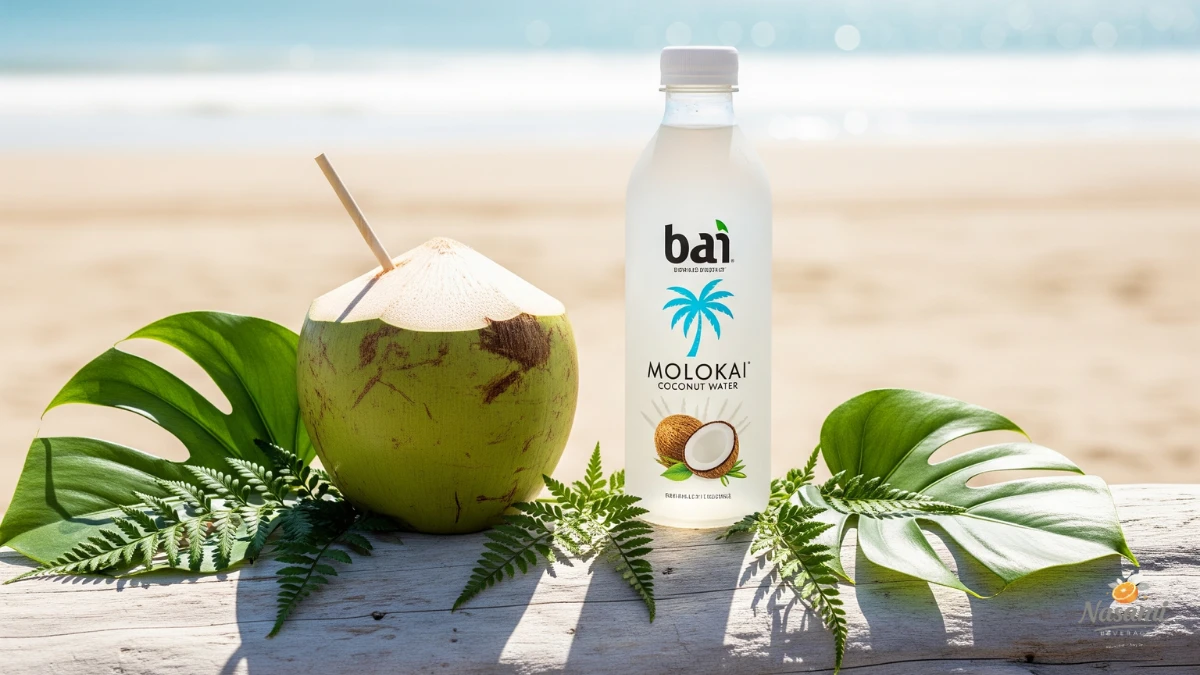
A brief overview of the Bai brand and its positioning
Bai positions itself as a forward-thinking beverage company focused on creating flavorful drinks that are low in sugar and calories. Their “Antioxidant Infusion” tagline highlights the inclusion of coffeefruit extract and white tea extract, which are sources of antioxidants. The overall goal is to offer a guilt-free beverage option for health-conscious consumers.
Key ingredients in Bai Coconut Water
The ingredient list for Bai Molokai Coconut typically includes filtered water, Bai’s proprietary sweetener blend (erythritol, stevia leaf extract), coconut water concentrate, and natural flavors. It also contains white tea extract, coffeefruit extract, and sea salt for electrolytes. [1] This composition makes it distinct from traditional, unsweetened coconut water.
How does it differ from traditional coconut water?
The primary difference lies in the ingredients and processing. While plain coconut water is simply the fluid from inside a young coconut, Bai is a formulated beverage. It uses coconut water concentrate diluted with filtered water and adds sweeteners, flavors, and antioxidant extracts. This results in a product that is often lower in calories and sugar than pure coconut water but also contains additives not found in the natural source.
Nutritional Breakdown of Bai Coconut Water
A core part of any bai antioxidant infusion review is a close look at the nutrition label. Bai’s main appeal is its favorable macronutrient profile compared to other flavored drinks.
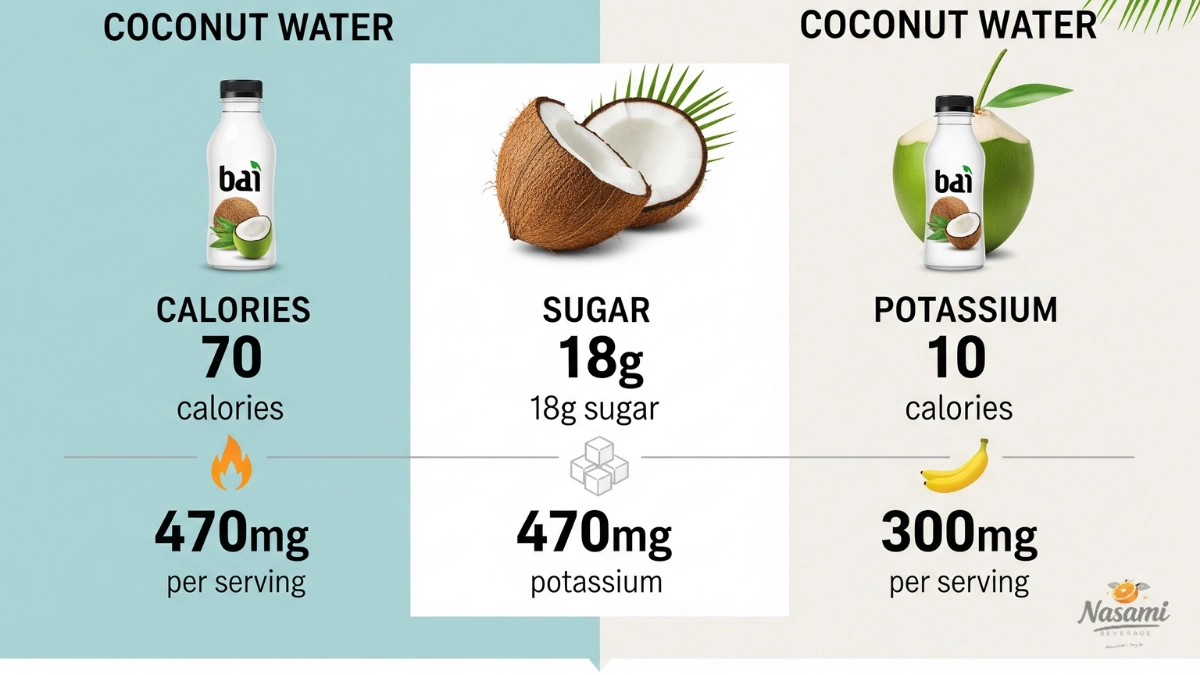
Calories, sugar, and carbohydrate content
A standard 18-ounce bottle of Bai Molokai Coconut contains approximately 10 calories and 1 gram of sugar. [2] It has around 12 grams of carbohydrates, with 10 of those coming from erythritol, a sugar alcohol that is largely indigestible and contributes minimal calories.
Electrolyte profile (potassium, sodium)
Bai contains key electrolytes like potassium and sodium, though typically in smaller amounts than pure coconut water. A bottle provides a modest amount of potassium, which is essential for nerve function and muscle contractions. [3] This makes it a decent option for light hydration, but athletes undergoing intense exercise might need a more potent electrolyte source.
Added vitamins and antioxidants
Bai drinks are infused with antioxidants from coffeefruit and white tea extract. Antioxidants help combat free radicals in the body, which can cause cellular damage. [4] The beverage also contains Vitamin C, another powerful antioxidant.
The Potential Health Benefits of Bai Coconut Water
Given its nutritional profile, there are several bai coconut water benefits for those seeking healthier drink options.
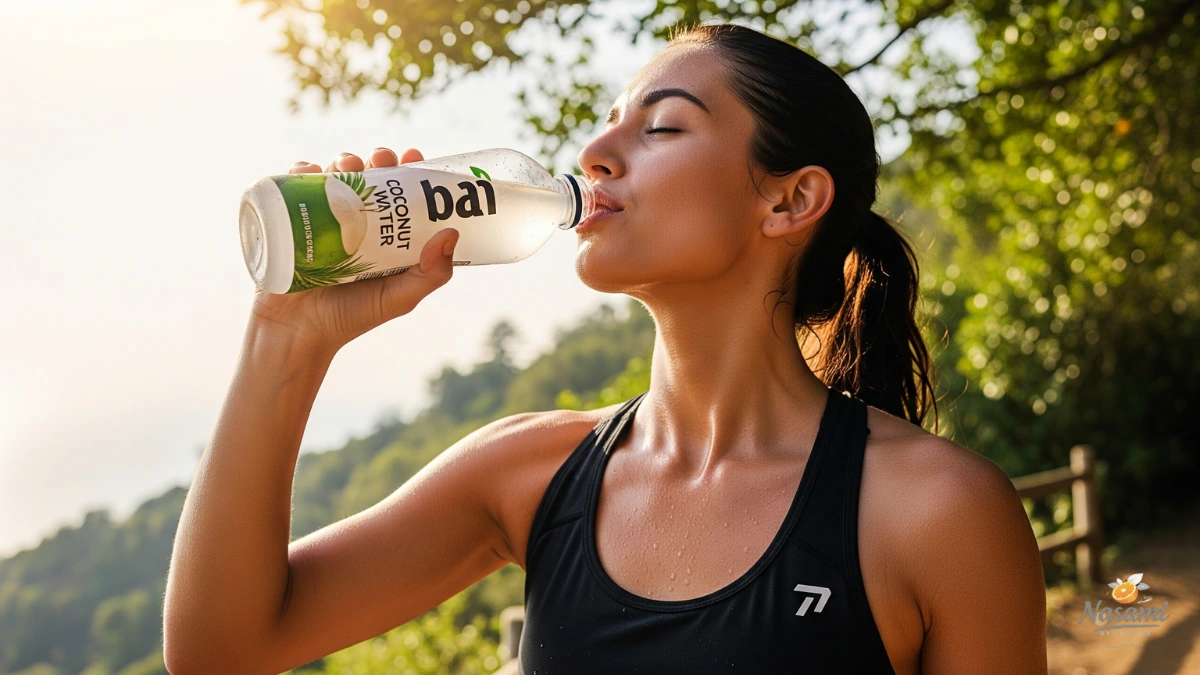
Hydration and electrolyte replenishment
Staying hydrated is crucial for overall health, and Bai can contribute to your daily fluid intake. The presence of electrolytes like potassium and sodium aids in hydration, making it a better choice than plain water after light physical activity. Knowing what is coconut juice good for often comes down to its hydrating properties.
Low in calories and sugar
For individuals managing their weight or blood sugar levels, Bai is an attractive option. With only 1 gram of sugar and 10 calories per bottle, it offers a sweet, flavorful experience without the metabolic impact of sugary sodas or juices. This aligns with the broader question of whether is coconut drink healthy, and in this context, its low sugar content is a significant plus.
Rich in antioxidants
The “Antioxidant Infusion” is not just a marketing term. The inclusion of coffeefruit and white tea extracts provides a source of polyphenols, which have antioxidant properties. A diet rich in antioxidants is linked to various long-term health benefits.
Potential Downsides and Considerations
Despite its benefits, there are several factors to consider before making Bai a daily habit. Understanding if are coconut water good for you involves looking at both the good and the bad.
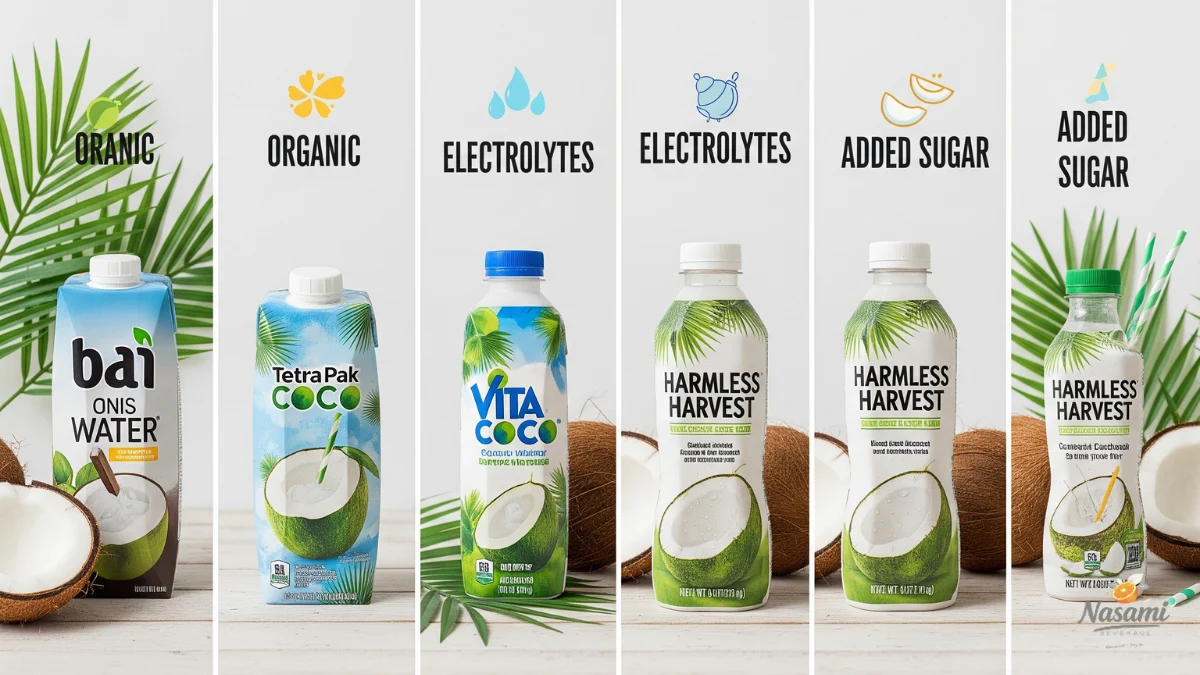
Use of natural sweeteners (stevia and erythritol) and potential digestive issues
Bai uses a blend of erythritol and stevia. While the FDA considers these sweeteners generally recognized as safe (GRAS), sugar alcohols like erythritol can cause digestive distress (gas, bloating, diarrhea) in some individuals, especially when consumed in large amounts. [5]
Caffeine content in some Bai products
It’s important to note that Bai beverages contain caffeine from white tea extract and coffeefruit extract. An 18-ounce bottle has approximately 55mg of caffeine, similar to a cup of green tea. [6] This may be a downside for those sensitive to caffeine or looking for a caffeine-free hydration option.
Customer reviews and flavor changes
Some long-time consumers have reported changes in the taste of Bai products over the years, leading to mixed reviews. Taste is subjective, but it’s a point to consider if you are particular about flavor consistency.
Potential risks of excessive coconut water consumption
While Bai contains less potassium than pure coconut water, it’s a relevant consideration. For individuals with kidney disease, consuming too much potassium can be dangerous as their kidneys may not be able to remove it effectively from the blood. [7]
Bai Coconut Water vs. Other Brands
How does Bai stack up against other options? When comparing it to the top coconut water brands, the differences are clear.
Comparison with pure coconut water brands like Harmless Harvest and Vita Coco
Brands like Harmless Harvest offer some of the best organic coconut water, which is typically not from concentrate and has no added sugars or flavors. Vita Coco, a leading brand, offers both pure coconut water and flavored versions.
The question of is vita coco actually coconut water can be answered with a ‘yes’, but like Bai, their flavored options contain additional ingredients. Generally, pure coconut waters have more natural sugars and calories but also higher levels of potassium and a simpler ingredient list.
How does it stack up against other flavored waters?
Compared to other “enhanced” or flavored waters, Bai holds its own. It offers more than just flavor by including antioxidants and electrolytes. Its low-calorie, low-sugar profile makes it a superior choice to many vitamin-enhanced waters that can contain significant amounts of hidden sugar.
The Verdict: Is Bai Coconut Water a Healthy Choice?
So, is bai coconut water healthy? The answer is nuanced. It can be a healthy choice for many people, but it’s not a direct substitute for natural, whole foods and pure water. As Virgil wisely said, “The greatest wealth is health,” and making informed beverage choices is a part of that wealth.
Who is it good for?
Bai Coconut Water is an excellent option for individuals looking to reduce their sugar intake, manage their weight, or find a flavorful alternative to soda. It’s also suitable for those seeking a light, post-workout refreshment with a small antioxidant boost.
Who should avoid it?
People with sensitivities to sugar alcohols or caffeine should approach Bai with caution. Additionally, individuals with pre-existing kidney conditions should consult their doctor before regularly consuming beverages with added potassium.
Moderation is key
Like any processed beverage, moderation is the best approach. Incorporating Bai Coconut Water as a treat or a flavorful hydration option within a balanced diet is a reasonable strategy. It should not replace plain water as your primary source of hydration.
Frequently Asked Questions
Is Bai Coconut Water better than regular coconut water?
“Better” depends on your goals. Bai is better for reducing sugar and calorie intake. Regular coconut water is better if you want higher natural electrolyte levels and a product with no additives or sweeteners.
Does Bai Coconut Water have any side effects?
The most common side effects are related to its ingredients. The erythritol may cause digestive upset in sensitive individuals, and the caffeine can affect those who are caffeine-intolerant.
Can I drink Bai Coconut Water every day?
For most healthy adults, drinking one bottle per day is unlikely to cause harm. However, consider the caffeine content and your overall diet. Relying on it as your main source of hydration is not recommended.
Is Bai Coconut Water good for weight loss?
As a low-calorie, low-sugar drink, it can be a helpful tool for weight loss when used to replace high-calorie beverages like soda or juice. It helps reduce overall calorie intake while satisfying a craving for sweetness.
